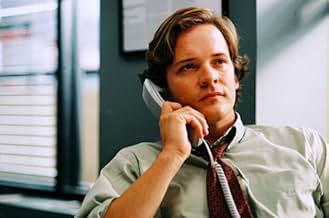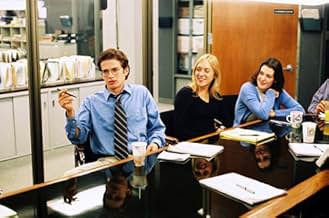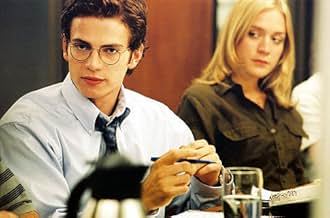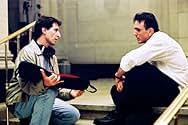Ajouter une intrigue dans votre langueThe story of a young journalist who fell from grace when it was discovered he fabricated over half of his articles from the publication The New Republic magazine.The story of a young journalist who fell from grace when it was discovered he fabricated over half of his articles from the publication The New Republic magazine.The story of a young journalist who fell from grace when it was discovered he fabricated over half of his articles from the publication The New Republic magazine.
- Réalisation
- Scénario
- Casting principal
- Récompenses
- 11 victoires et 28 nominations au total
Owen Roth
- Ian Restil
- (as Owen Rotharmel)
Avis à la une
A young D.C. journalist (new "Star Wars" trilogy star Hayden Christensen) for The New Republic political magazine falsifies data and produces fraudulent stories. Slowly but surely his would-be meteoric rise turns into a dizzying downfall. "Boys Don't Cry" alums Peter Saarsgard and Chloe Sevigny are out of this world as Christensen's editor and supportive co-worker. Based on a true story, the picture has a tense documentary feel to it that makes it highly engrossing and fascinating early. The production does begin to tire late though as Christensen's crazed personality starts to come shining through with dementedly over-the-top results. Still a well-paced and intelligent take on American journalism and the pressures associated with the field. Worth a legitimate chance. 4 stars out of 5.
I had been recommended Shattered Glass a half-dozen times by a friend. He said, after watching it - it's not a great movie, but it is really, really good. I'll disagree. Shattered Glass is a great movie.
It's not a great film (aye, there's the rub), but it is a great movie. It's entertainment, pure and simple, but it's also entertainment with depth. In that respect, it's a little like Spider Man 2.
In Shattered Glass, you'll find steady direction, sure-handed editing, an interestingly designed narrative, characters that are drawn well-enough but not so well that they overpower the story's forward movement, etc. You'll also find excellent performances.
Peter Sarsgaard, Chloe Sevigny, Steve Zahn, Rosario Dawson - they're all excellent (which they've all proved in other movies as well). Hayden Christensen, though, who was so wooden in Star Wars Episode 2, is amazing. His portrayal of Glass, though not perfect, is revelatory; he can actually act. Given time and the aid of excellent directors, Christensen will really blossom. Shattered Glass is, simply put, a solidly made movie about a journalist without the requisite integrity.
But why isn't this a great film and only top-notch entertainment? Well, it really comes down to the simple fact that Shattered Glass only scratches a surface that, in light of Jayson Blair and those of that ilk, deserves a little more attention. Of course, though, this is a film about a single event. It's not about compulsive lying or, really, lack of journalistic integrity. It touches on those subjects without delving into them. That is my only complaint. As a movie about a lying journalist, though, it's fast-paced, thrilling, and entertaining, and I think everyone will enjoy it.
It's not a great film (aye, there's the rub), but it is a great movie. It's entertainment, pure and simple, but it's also entertainment with depth. In that respect, it's a little like Spider Man 2.
In Shattered Glass, you'll find steady direction, sure-handed editing, an interestingly designed narrative, characters that are drawn well-enough but not so well that they overpower the story's forward movement, etc. You'll also find excellent performances.
Peter Sarsgaard, Chloe Sevigny, Steve Zahn, Rosario Dawson - they're all excellent (which they've all proved in other movies as well). Hayden Christensen, though, who was so wooden in Star Wars Episode 2, is amazing. His portrayal of Glass, though not perfect, is revelatory; he can actually act. Given time and the aid of excellent directors, Christensen will really blossom. Shattered Glass is, simply put, a solidly made movie about a journalist without the requisite integrity.
But why isn't this a great film and only top-notch entertainment? Well, it really comes down to the simple fact that Shattered Glass only scratches a surface that, in light of Jayson Blair and those of that ilk, deserves a little more attention. Of course, though, this is a film about a single event. It's not about compulsive lying or, really, lack of journalistic integrity. It touches on those subjects without delving into them. That is my only complaint. As a movie about a lying journalist, though, it's fast-paced, thrilling, and entertaining, and I think everyone will enjoy it.
As the subject line above says, I have to admit to an insider's point of view. I was an award-winning investigative reporter and editor working in newspapers, magazines, wire services, radio, and network-affiliate TV. I quit journalism in 1980 in large part because of the ever-increasing number of talent-challenged first-year "journalists" who wanted to be the next Woodward/Bernstein, and worse, the willingness of management (especially in local television news) to hire and even promote them. To be honest, however, I would have to add that the low pay, true even at places like The New Republic, was a major factor to an expectant father.
So I am sad to say that I completely buy the characterizations presented in this docudrama on Stephen Glass' time at that august magazine. The only thing that didn't ring true was that I never met anyone who had the time or inclination to be as considerate of his fellow journalists as Steve Glass apparently was. My wife pointed out that she never met one journalistic co-worker she would spend time with if she had the choice. I would admit that the nicest I knew were, at best, benign. I should add that I was NOT the nicest I knew. Even I didn't like me those days.
Getting back to the film, I can't speak to what actually motivated this particular person to fabricate 27 of 41 stories at a very major national magazine. The film suggests that he was too eager to please, and perhaps that is true. But that probably wasn't what motivated Jayson Blair (at the New York Times) or others who have recently been exposed as serial fabricators. Ambition unrestrained by ethics, unreasonable pressure to succeed due to premature promotions, other unknown and perhaps unknowable motivations... they probably figure into these sorts of disasters. But what is certainly true, and given very short shrift by the film, is the role journalistic management plays. To put a rather fine point to it, too many editors do not know how to, or perhaps just don't like to, do their jobs.
Too many times I see on national news programs statements treated as fact that somehow I can't believe were ever fact-checked. Just today I saw an episode of HBO's RealSports where an amazing statistic was mentioned: that a certain percentage (I believe about 4% but wasn't taking notes) of people who start playing poker as young kids go on to have gambling problems. I instantly asked myself: where did those statistics come from? Poker playing among the very young (pre-college-age) was probably a fairly rare thing before the past couple of years. How would they know today that 15 years ago such-and-such a percent would later have problems? If you understand statistics you would know that you can't find gambling addicts now, ask how many played poker as young kids, and extrapolate any useful estimate of future danger (100% of alcoholics once drank socially, but that doesn't mean 100% of social drinkers go on to become alcoholics). So did some editor at RealSports check this out? Why don't I believe someone did?
In writing this six-paragraph movie review, perhaps to be seen by no one, I checked things over time and again for accuracy. Oops: I misspelled Jayson Blair; fix it. Spelling errors no one cares about in this Internet-only story: check the entire piece in an external spell checker. In all I made almost two dozen changes. No one reading this will notice, or if they do, care. But that is what I do because I once was an editor.
It is this instinct for distrust of EVERYTHING anyone says or writes, including oneself and one's own work, that I believe is missing in far too many editors today. It is this shortcoming that allowed Stephen Glass, Jayson Blair et al to last so long before being exposed. It is a major weakness in journalism, and the lack of acknowledgement of this weakness is the only fault I found in this otherwise excellent film.
So I am sad to say that I completely buy the characterizations presented in this docudrama on Stephen Glass' time at that august magazine. The only thing that didn't ring true was that I never met anyone who had the time or inclination to be as considerate of his fellow journalists as Steve Glass apparently was. My wife pointed out that she never met one journalistic co-worker she would spend time with if she had the choice. I would admit that the nicest I knew were, at best, benign. I should add that I was NOT the nicest I knew. Even I didn't like me those days.
Getting back to the film, I can't speak to what actually motivated this particular person to fabricate 27 of 41 stories at a very major national magazine. The film suggests that he was too eager to please, and perhaps that is true. But that probably wasn't what motivated Jayson Blair (at the New York Times) or others who have recently been exposed as serial fabricators. Ambition unrestrained by ethics, unreasonable pressure to succeed due to premature promotions, other unknown and perhaps unknowable motivations... they probably figure into these sorts of disasters. But what is certainly true, and given very short shrift by the film, is the role journalistic management plays. To put a rather fine point to it, too many editors do not know how to, or perhaps just don't like to, do their jobs.
Too many times I see on national news programs statements treated as fact that somehow I can't believe were ever fact-checked. Just today I saw an episode of HBO's RealSports where an amazing statistic was mentioned: that a certain percentage (I believe about 4% but wasn't taking notes) of people who start playing poker as young kids go on to have gambling problems. I instantly asked myself: where did those statistics come from? Poker playing among the very young (pre-college-age) was probably a fairly rare thing before the past couple of years. How would they know today that 15 years ago such-and-such a percent would later have problems? If you understand statistics you would know that you can't find gambling addicts now, ask how many played poker as young kids, and extrapolate any useful estimate of future danger (100% of alcoholics once drank socially, but that doesn't mean 100% of social drinkers go on to become alcoholics). So did some editor at RealSports check this out? Why don't I believe someone did?
In writing this six-paragraph movie review, perhaps to be seen by no one, I checked things over time and again for accuracy. Oops: I misspelled Jayson Blair; fix it. Spelling errors no one cares about in this Internet-only story: check the entire piece in an external spell checker. In all I made almost two dozen changes. No one reading this will notice, or if they do, care. But that is what I do because I once was an editor.
It is this instinct for distrust of EVERYTHING anyone says or writes, including oneself and one's own work, that I believe is missing in far too many editors today. It is this shortcoming that allowed Stephen Glass, Jayson Blair et al to last so long before being exposed. It is a major weakness in journalism, and the lack of acknowledgement of this weakness is the only fault I found in this otherwise excellent film.
After reading the synopsis, I thought it would be a TV movie type detective-like drama where they Glass's case is investigated. Also the fact that Hayden Christensen was playing the title role was a discouraging factor as I didn't like him in any of his other films that I have so far seen (especially of the Star Wars franchise). But, 'Shattered Glass', based on an article written by Buzz Bissinger, springs quite a surprise. Through Billy Ray's solid writing, he tells an engaging story of a young reporter, Stephen Glass who was recognized as a top reporter until his 'fall from grace'. 'Shattered Glass' can be seen as a character study or a psychological thriller. Perhaps it could have been an interesting perspective to see what mental conflicts Glass was going through while 'fibbing'. However, here we mostly see him as an outsider and as an outsider we discover that Glass is both insecure (and vulnerable) but at the same time very confident and manipulative. But this also leaves us questioning who Glass really is and that's what helps build up the tension. Is he really, as Chloë Sevigny's Caitlin initially says, an exhausted young reporter or a pathological liar? Christensen is a pleasant surprise as he does a brilliant job in bringing out the layers of Glass's personality. One knows what he did is despicable but yet manages to sympathize after seeing his weakness. The supporting cast that includes a scene-stealing Peter Sarsgaard, a vibrant Chloë Sevigny, an exceptional Hank Azaria and an excellent Steve Zahn. While 'Shattered Glass' raises a lot questions and issues, it eventually reminds the viewer of something very relevant, especially in today's world, that a life with dignity is always preferable to a lie based on lies. An outstanding and brutally honest movie.
This fascinating study of journalistic malpractice is not only one of the best American films of 2003, but the best movie about journalism itself since ALL THE PRESIDENT'S MEN. It's a complex, intimate character study that's simultaneously tragic and funny thanks to a brilliant performance by Hayden Christensen, who in his portrayal of New Republic writer Stephen Glass is almost nauseatingly amoral yet strangely sympathetic--like the other characters in the film (all of whom are excellently played by the best ensemble cast since TRAFFIC), the viewer roots for Glass to be innocent of journalistic fraud in spite of all the evidence to the contrary. And if the movie is entertaining and emotionally involving on the micro-level of ensemble character study, on the macro-level of social and historical sweep it's an absolute masterpiece, a witty and terrifying satire about what Americans want from their news media and how easy it is to lie and be lied to in a society that values sensationalism over substance. First-time director Billy Ray uses the 'scope frame expressively yet with subtlety and restraint--there isn't a moment in this film in which the camera fails to find the perfect way of emphasizing the dynamic drama that's already there on the page and in the performances.
Le saviez-vous
- AnecdotesThe real Stephen Glass was offered a role. He declined.
- GaffesAt 47:59 there is an overlay on the screen saying it is May 8, 1998, and lane is going in to discuss the fallout from the article Hack Heaven. But the article had been published May 18th, 1998.
- Citations
Stephen Glass: [Outside the closed restaurant] I didn't do anything wrong, Chuck.
Chuck Lane: I really wish you'd stop saying that.
- Versions alternativesThere are three versions available, of different lengths. Runtimes are: "1h 34m (94 min)", the most available, theatrical cut, "1h 29m (89 min) (Australia)" and "1h 39m (99 min) (Toronto International) (Canada)" film festival original cut.
- Bandes originalesWild Thing
Written by Chip Taylor
Performed by X
Used by permission of EMI Blackwood Music Inc.
Courtesy of Elektra Entertainment Group
By Arrangement with Warner Strategic Marketing
Meilleurs choix
Connectez-vous pour évaluer et suivre la liste de favoris afin de recevoir des recommandations personnalisées
Détails
- Date de sortie
- Pays d’origine
- Langue
- Aussi connu sous le nom de
- El precio de la verdad
- Lieux de tournage
- Sociétés de production
- Voir plus de crédits d'entreprise sur IMDbPro
Box-office
- Budget
- 6 000 000 $US (estimé)
- Montant brut aux États-Unis et au Canada
- 2 220 008 $US
- Week-end de sortie aux États-Unis et au Canada
- 77 540 $US
- 2 nov. 2003
- Montant brut mondial
- 2 944 752 $US
- Durée
- 1h 34min(94 min)
- Couleur
- Mixage
- Rapport de forme
- 2.35 : 1
Contribuer à cette page
Suggérer une modification ou ajouter du contenu manquant







































